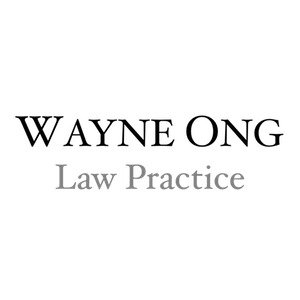Best Lawsuits & Disputes Lawyers in Cecil
Share your needs with us, get contacted by law firms.
Free. Takes 2 min.
List of the best lawyers in Cecil, Singapore
Singapore Lawsuits & Disputes Legal Articles
Browse our 2 legal articles about Lawsuits & Disputes in Singapore written by expert lawyers.
- Mediation: Keeping disputes out of court
- To all business owners, managers, and executives. You start your business. You have a dispute. One thing that you will definitely regret in such a case is not having a mandatory Mediation Clause in your agreements.Singapore is at the forefront of the movement to encourage mediation instead of more abrasive... Read more →
- Corporate Tip – Shareholder’s Agreement
- I started my law firm renting desk space at a very kind lawyer’s office. He was my first boss in Law, Mr Alain A Johns of Alain A Johns Partnership. I was his intern for two months in 2006. We were having coffee one day in late 2017 when I... Read more →
About Lawsuits & Disputes Law in Cecil, Singapore:
The framework of Lawsuits and Disputes in Cecil, Singapore is largely governed by the principles of Singapore's common law system. The topics under this category can range widely, encompassing contractual disputes, negligence claims, industrial relations disputes, defamation suits, tort liabilities, and much more. Singaporean law emphasizes just, expeditious, and economical resolution of disputes and has a robust system of resolving disputes that includes litigation, arbitration, and mediation.
Why You May Need a Lawyer:
In situations where you are involved in a lawsuit or dispute, the legal complexities can be daunting and you could potentially face substantial financial risk. Having a lawyer can provide you with a clear understanding of your legal position, rights, and obligations. Additionally, engaging a lawyer can be crucial in ensuring your interests are represented adequately, especially during negotiations or court proceedings. They can also help guide you on the best course of action based on the specific circumstances of your case.
Local Laws Overview:
The central legislation governing civil disputes in Singapore is the Civil Law Act, under which various types of claims and liabilities can be brought forward. The Constitution of Singapore also plays a key role in providing the basic rules and norms that govern the nation. There are specific statutes which are related to specific types of disputes as well like Defamation Act for defamation suits, and Employment Act for employment-related disputes. The Limitation Act bars certain lawsuits from being initiated after the expiration of a stipulated period. Rules of the commercial substantive and procedural law may also be relevant in business disputes.
Frequently Asked Questions:
Q1: Can I represent myself in court?
Yes, you may represent yourself in court; however, due to the complexities involved in legal proceedings, it is generally recommended that you engage a lawyer for representation.
Q2: How much does it cost to file a lawsuit?
The cost to file a lawsuit in Singapore varies, depending on the nature of the claim. Filing fees, hearing fees, and lawyer’s fees must be considered.
Q3: How long does a lawsuit typically take?
The length of a lawsuit greatly depends on the specifics of the case. It can take anywhere from a few months to several years.
Q4: What is the statute of limitations for filing a lawsuit?
The Limitation Act provides different limitation periods for various types of action. Generally, for contract and tort actions, the limitation period is six years.
Q5: What is the role of a mediator in a dispute?
A mediator aids in dispute resolution by helping parties to clarify issues, identify underlying interests, and explore possible solutions, with an aim to reach a mutually satisfactory agreement.
Additional Resources:
Key resources for individuals seeking information on Singapore’s civil justice system include the Singapore Courts' website, the Ministry of Law's website, the Singapore Academy of Law, and the Law Society of Singapore. These institutions provide a wealth of information and detailed guidelines on Singapore’s various legal processes.
Next Steps:
If you find that you need legal assistance, it is advisable to engage a lawyer who specializes in the field of law that your issue pertains to. You can find and contact suitable lawyers via the Law Society of Singapore. Do note that before engaging a lawyer, you should understand the scope of the lawyer's services and the related costs.
Lawzana helps you find the best lawyers and law firms in Cecil through a curated and pre-screened list of qualified legal professionals. Our platform offers rankings and detailed profiles of attorneys and law firms, allowing you to compare based on practice areas, including Lawsuits & Disputes, experience, and client feedback.
Each profile includes a description of the firm's areas of practice, client reviews, team members and partners, year of establishment, spoken languages, office locations, contact information, social media presence, and any published articles or resources. Most firms on our platform speak English and are experienced in both local and international legal matters.
Get a quote from top-rated law firms in Cecil, Singapore — quickly, securely, and without unnecessary hassle.
Disclaimer:
The information provided on this page is for general informational purposes only and does not constitute legal advice. While we strive to ensure the accuracy and relevance of the content, legal information may change over time, and interpretations of the law can vary. You should always consult with a qualified legal professional for advice specific to your situation.
We disclaim all liability for actions taken or not taken based on the content of this page. If you believe any information is incorrect or outdated, please contact us, and we will review and update it where appropriate.
Browse lawsuits & disputes law firms by service in Cecil, Singapore
Cecil, Singapore Attorneys in related practice areas.








